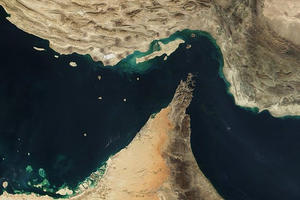 Abdullah is�right to repeat the�invitation to Tehran to either have bilateral talks or meet at international courts
Abdullah is�right to repeat the�invitation to Tehran to either have bilateral talks or meet at international courtsIran has occupied three of the UAE�s islands for decades and has refused the UAE�s efforts to take the issue to a peaceful settlement in the international courts. Recently, Iran has started deliberately provoking the UAE over its occupation, with regular visits by senior government officials to Abu Mousa, the largest of the three islands that also include Greater Tunb and Lesser Tunb.
The visit by members of Iran�s Shura Council has been condemned by the Ministry of Foreign Affairs and the Federal National Council, but this visit follows a high-profile visit to Abu Mousa in April last year by Mahmoud Ahmadinejad, the Iranian President.
Ahmadinejad used the occasion to make an inflammatory speech, in which he repeated Iran�s claim that the islands belonged to Iran and emphasised Tehran�s claim to control the Gulf, referring to it as the �Persian� Gulf. He is clearly using the issue of the UAE�s islands to boost his nationalist credentials as he reinforces his aggressive political profile, so that he can push more influence to the candidate that he chooses to back from his faction in the Iranian presidential elections that are due to be held next month.
The UAE has steadily refuted these Iranian claims and this week, the Ministry of Foreign Affairs repeated its well-established line that these visits are �a flagrant violation of the sovereignty of the UAE over its territory�. The ministry also spelt out that such Iranian actions �undermine all efforts to find a peaceful solution to this issue through bilateral negotiations or through recourse to the International Court of Justice�.
This has been made clear by both speaking directly to the Iranians and at a variety of international gatherings, when the UAE has sought a peaceful solution to this serious issue. In the UAE�s speech to the annual UN General Assembly, the issue of the occupied islands is always raised, as well as at many other international forums, such as the Conference on Interaction and Confidence Building Measures in Asia in October last year, when Shaikh Abdullah Bin Zayed Al Nahyan, the UAE Foreign Minister, repeated the UAE�s position that �though this occupation is illegitimate, the UAE is still committed to international mediation or direct negotiations to reach a settlement to the territorial dispute that poses a threat to international stability�.
The issue goes back to 1971 when, on the eve of the creation of the UAE, the Shah�s forces invaded the islands of Greater and Lesser Tunb, a part of Ras Al Khaimah, and landed troops on Abu Mousa, which is part of Sharjah. The forces of the new nation were not able to react and the British forces did not get involved as they were in the process of final withdrawal from the region.
Even if the UAE is determined not to go to war over the issue, it is very important to find an answer to the clash. It is dangerous for neighbours like the UAE and Iran, which normally have good relations and extensive economic links, to have such a destabilising issue lurking between them. It may have a major impact on maritime and oil rights and can be used by an unscrupulous Iranian government to create all sorts of clashes.
For example, the Iranians may seek to put more troops on the islands or institute naval patrols in their proximity, which will have a direct effect on the security of the massive amount of shipping that passes through the Arabian Gulf and the Strait of Hormuz. This is why the UAE has been pushing to seek a peaceful resolution.
However, given the frantic state of Iranian politics, the UAE has not found a government that is willing to discuss the issue calmly and it is not likely to find one for some time. The Iranians are focused on their clash with the international community over their nuclear programme and its alleged military element.
After the Iranian elections, the Barack Obama administration will want to move to some kind of a showdown, which is also predicated by the slow advance of Iranian mastery of nuclear technology, which takes them closer to being able to assemble a nuclear weapon.
This confrontation will consume all the new Iranian government�s attention and it will neither have the time nor willingness to engage the UAE over the islands, which is why the Ministry of Foreign Affairs is right to stay steadfast and hang on to the underlying realities when it says that the Iranian actions cannot change the historical and legal facts on the ground or deny the existing facts that the three islands are occupied by Iran, while at the same time pointing out that �the UAE has historical relations with the Islamic Republic of Iran and is keen on strengthening the relationship through removing all impediments�.
By Gulf News
The Iran Project is not responsible for the content of quoted articles.










